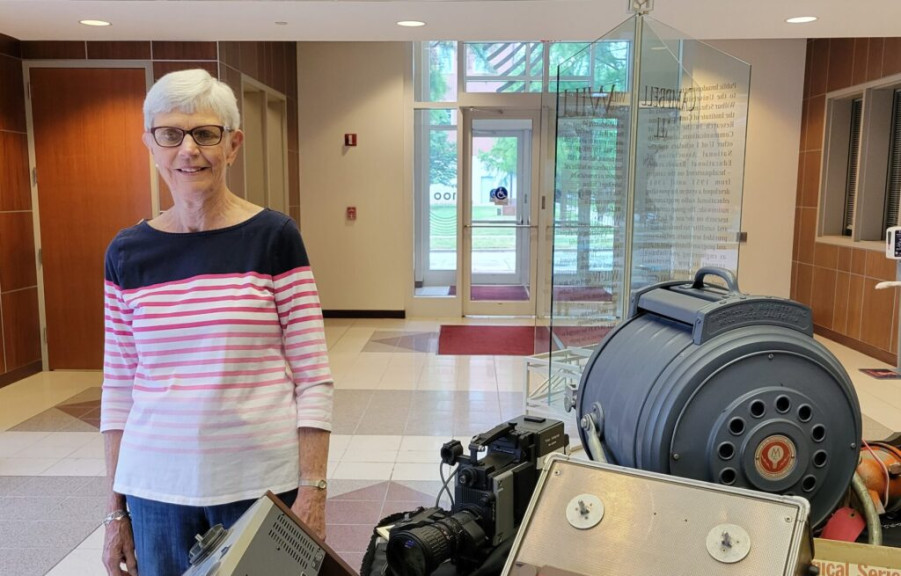WILL at 100: Debbie Day on how WILL audience members became ‘Friends of WILL’

Debbie Day stands near a display of memorabilia celebrating WILL's 100th anniversary in the lobby of Campbell Hall. Jim Meadows/Illinois Public Media
The University of Illinois launched WILL-AM 100 years ago, in April of 1922. An FM station signed on in 1942, followed by WILL-TV in 1955. For the first 50 years, the university provided most of the operating money for its broadcasting stations, with the occasional outside gift.
WILL received a big boost in the late 1960s, with the advent of federal funding that supported local public stations, as well as the new networks, NPR and PBS. But the new financial support came with new goals and expectations for public broadcasting that federal funding didn’t cover. So, in the 1970s, public radio and TV stations in the U.S. launched campaigns to raise money from their listeners and viewers.
Debbie Day was hired to lead those fundraising efforts at WILL Radio and TV, continuing in that role until her retirement in 2006. Day was WILL’s first development director, but her first job at the station came in 1974, as the part-time coordinator of the Friends of WILL.
Day says the Friends of WILL was an ambitious project conceived by then-director of broadcasting Don Mullally.
“Don Mullally’s idea of fundraising was to recruit volunteers into a not-for-profit organization,” said Day. “They would do things for WILL, but they would have their own officers and their own ideas, but obviously, they had to be approved by Don. But then we discovered that in the Illinois statutes, this would not be allowed.”
Day says that with that restriction, due to WILL being a unit of a state university, the Friends of WILL instead became an informal group of WILL’s donors and volunteers, and she became their in-house director. In this capacity, the Friends of WILL answered phones during fundraising broadcasts, and helped out during such activities as used record sales and on-air auctions that the stations experimented with in the 1970s and ‘80s.
As Day explains in an Illinois Public Media interview, the Friends of WILL got their first workout in the summer of 1974, when WILL held its first-ever on-air fundraiser.
DEBBIE DAY: We had to explain that if we were going to develop into a really full-fledged public operation, that we had to raise some money. So, people I think were receptive. And many, of course, were so devoted that if the littlest thing might go wrong, they would call and tell us. But they also volunteered and donated.
MEADOWS: It was really different back then. There was no Internet, there was no home video. And for things like television and radio, there were a lot of commercial stations. And then there would be usually one educational, then public TV and radio station.
DEBBIE DAY: Back in the 70s, really, most of the public radio stations were affiliated with a college or university. They grew out of the need for educational programming, which really began to change in the mid-70s. The programming didn’t change that much, but they just bent it a bit to appeal, perhaps more to a general audience. The public part really was reinforced when volunteers started coming into the station, and helping with fundraising primarily.
MEADOWS: The fundraising that we did, it all used in the earlier days volunteers, we had volunteers answering phones —
DEBBIE DAY: Yes.
MEADOWS: And that would be part of the things I remember of television fundraising program,s is that you would see these rows of volunteers out in the TV studio waiting for your phone call.
DEBBIE DAY: That’s right. It made fundraising I think, more personal. Here are friends — I might know that somebody who’s behind one of those phones. Maybe I should think about doing that myself.
MEADOWS: When you look back on your years at WILL, starting with that part time job as Friends coordinator, through your longer tenure as development director, what was the most rewarding part of the job for you?
DEBBIE DAY: I think, really, working with the donors was wonderful, because they were dedicated, and they really wanted to help and be a part of it. And the satisfaction of making fundraising goals and knowing that that feeds directly into WILL And that money has covered all kinds of needs. So, it’s very exciting when goals are met, and they are realistic goals. They aren’t just pie in the sky.
